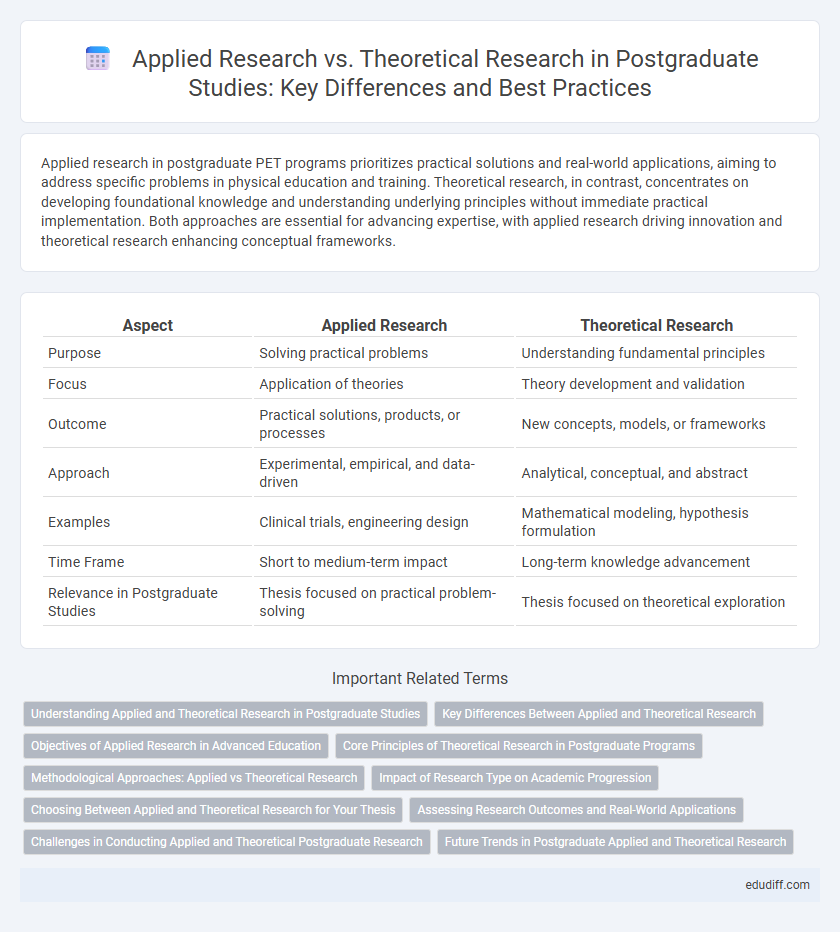Applied research in postgraduate PET programs prioritizes practical solutions and real-world applications, aiming to address specific problems in physical education and training. Theoretical research, in contrast, concentrates on developing foundational knowledge and understanding underlying principles without immediate practical implementation. Both approaches are essential for advancing expertise, with applied research driving innovation and theoretical research enhancing conceptual frameworks.
Table of Comparison
| Aspect | Applied Research | Theoretical Research |
|---|---|---|
| Purpose | Solving practical problems | Understanding fundamental principles |
| Focus | Application of theories | Theory development and validation |
| Outcome | Practical solutions, products, or processes | New concepts, models, or frameworks |
| Approach | Experimental, empirical, and data-driven | Analytical, conceptual, and abstract |
| Examples | Clinical trials, engineering design | Mathematical modeling, hypothesis formulation |
| Time Frame | Short to medium-term impact | Long-term knowledge advancement |
| Relevance in Postgraduate Studies | Thesis focused on practical problem-solving | Thesis focused on theoretical exploration |
Understanding Applied and Theoretical Research in Postgraduate Studies
Applied research in postgraduate studies emphasizes practical problem-solving, utilizing empirical methods to address real-world challenges across various disciplines. Theoretical research focuses on developing abstract frameworks and models to advance knowledge without immediate practical application. Mastery of both approaches enhances critical thinking and innovation in postgraduate academic and professional pursuits.
Key Differences Between Applied and Theoretical Research
Applied research focuses on practical problem-solving by utilizing existing theories to develop concrete applications, while theoretical research emphasizes the formulation and testing of new theories to expand knowledge. Key differences include objectives, with applied research targeting real-world issues and theoretical research aiming to understand underlying principles; methodologies, where applied research often involves experiments and data collection in real environments, whereas theoretical research relies on abstract modeling and hypothesis formulation. The impact differs as well, with applied research driving innovation and product development, and theoretical research contributing to foundational scientific advancements.
Objectives of Applied Research in Advanced Education
Applied research in advanced education aims to address practical problems and improve educational processes through empirical investigation. It focuses on generating actionable solutions that enhance learning outcomes, curriculum development, and institutional effectiveness. This research prioritizes the implementation of findings to directly impact teaching methods and policy-making within postgraduate programs.
Core Principles of Theoretical Research in Postgraduate Programs
The core principles of theoretical research in postgraduate programs emphasize abstract conceptualization, systematic inquiry, and the development of frameworks that explain phenomena without immediate practical application. This approach prioritizes hypothesis formulation, logical coherence, and rigorous validation through literature synthesis and modeling. Theoretical research provides foundational insights that guide applied research methodologies and innovation across various academic disciplines.
Methodological Approaches: Applied vs Theoretical Research
Applied research employs practical methodological approaches such as case studies, field experiments, and surveys designed to solve real-world problems and inform policy or practice. Theoretical research relies on conceptual modeling, hypothesis formulation, and analytical reasoning to develop and refine existing theories without immediate practical application. Distinct methodological techniques in applied research emphasize empirical data collection, whereas theoretical research prioritizes abstract reasoning and critical analysis.
Impact of Research Type on Academic Progression
Applied research directly addresses real-world problems, often leading to practical innovations that enhance a postgraduate's portfolio and increase opportunities for industry collaboration and funding. Theoretical research primarily contributes to foundational knowledge and intellectual advancement, which is highly valued in academic progression through publications and citations in scholarly journals. Balancing both research types can optimize academic impact, as applied research drives immediate societal benefits, while theoretical research fosters long-term disciplinary development.
Choosing Between Applied and Theoretical Research for Your Thesis
Selecting between applied and theoretical research for your postgraduate thesis depends on your career goals and academic discipline. Applied research emphasizes practical solutions and real-world applications, making it ideal for fields like engineering, healthcare, and education. Theoretical research prioritizes developing new concepts and models, contributing to academic knowledge in areas such as mathematics, philosophy, and fundamental sciences.
Assessing Research Outcomes and Real-World Applications
Applied research directly addresses practical problems by generating outcomes that can be implemented to improve processes, products, or services, ensuring measurable real-world impact. Theoretical research advances knowledge by developing models and frameworks that enhance understanding but may require further validation before practical application. Assessing research outcomes involves evaluating the applicability, effectiveness, and scalability of findings, with applied research often demonstrating more immediate benefits in postgraduate projects.
Challenges in Conducting Applied and Theoretical Postgraduate Research
Applied postgraduate research encounters challenges such as limited access to real-world data and difficulties in translating practical problems into research questions. Theoretical research faces obstacles including abstract modeling complexities and the need for advanced conceptual frameworks without immediate empirical validation. Both approaches demand rigorous methodological design and significant critical thinking to address discipline-specific issues effectively.
Future Trends in Postgraduate Applied and Theoretical Research
Future trends in postgraduate research emphasize the integration of applied research methodologies with theoretical frameworks to address complex real-world problems and advance academic knowledge. Emerging technologies such as artificial intelligence, big data analytics, and interdisciplinary collaboration are driving innovations in both applied and theoretical postgraduate research fields. Increased funding and institutional support for translational research highlight the growing importance of bridging theoretical insights with practical applications in postgraduate studies.
Applied Research vs Theoretical Research Infographic

 edudiff.com
edudiff.com